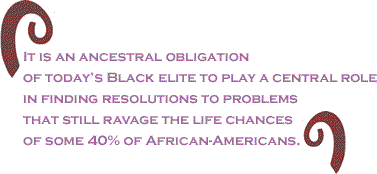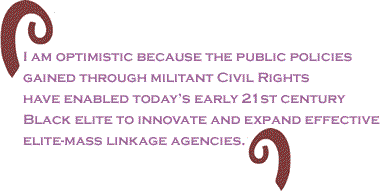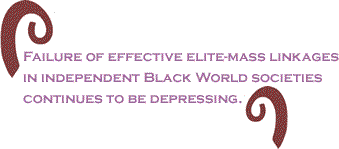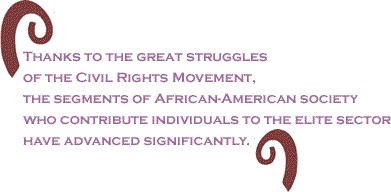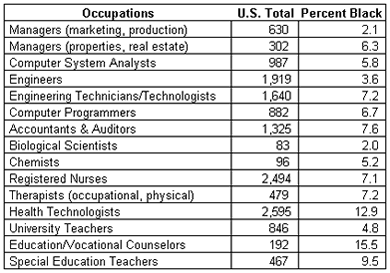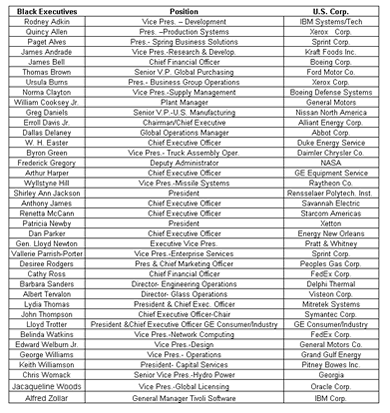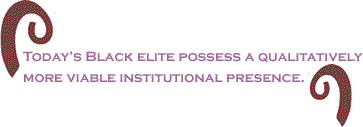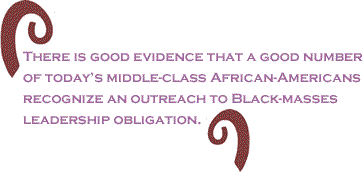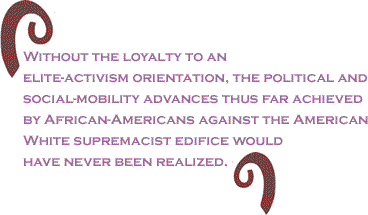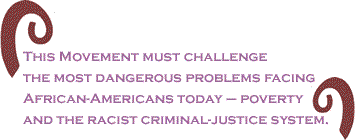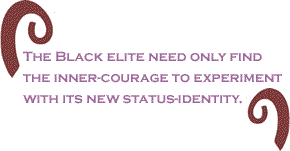
|
|||||||||||||||||||||
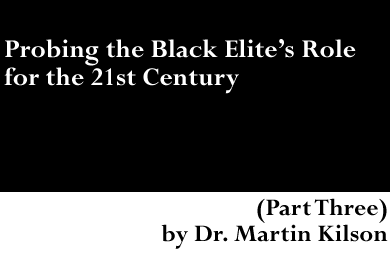 |
|
As I argued in Part II of this essay, when viewed in terms of the three-fold poverty, education, and criminal-justice problem areas, there is little doubt that the lower-tier or “static-stratum” African-American families constitute the crisis-development fault line among African-Americans in the early 21st century. While fundamental solutions to the crisis-development fault line among poor and working-class African-Americans must be generated by national processes – political and economic – it is, I submit, an ancestral obligation of today’s Black elite to play a central role in finding resolutions to problems that still ravage the life chances of some 40% of African-Americans. Outreach-To-Black-Masses-Leadership Is A Moral Imperative This is an obligation-and-responsibility that comes down to us from the DuBoisian leadership legacy, initially formulated by W.E.B. DuBois in 1903 in The Souls of Black Folk where he observed that if the then embryonic Black elite – “the Talented Tenth” as DuBois called it – fails
Furthermore, DuBois gave credit for the idea of the activist organization of an outreach-to-Black-masses leadership to the early 19th century Black abolitionist David Walker whom DuBois called in 1940 the first Black leader to fashion a “program of organized opposition to the action and attitude of the dominant white group,” obligating Black leadership to “ceaseless agitation and insistent demand for equality.” – W.E.B. DuBois, Dusk of Dawn: An Essay Toward an Autobiography of a Race Concept (1940) p. 193.
The African-American historian Dennis Dickerson of Vanderbilt University (also editor of The AME Church Review, the oldest African-American intellectual organ founded by AME Bishop Benjamin Tanner in Philadelphia in 1884) spoke cogently to this crucial Black elite obligation-and-responsibility issue in 2001. Posing the question, “Has the ‘Talented Tenth’ forgotten their ‘impoverished kin’?” Professor Dickerson responded:
In view of my observation above that it is an ancestral obligation of today’s Black elite to play a central role in fashioning solutions to the problems that still ravage the life chances of 40% of working-class and poor African-American households, I myself remain optimistic that a significant section of today’s Black elite will in fact perform this function. I am optimistic first and foremost because from the start of the Emancipation Era after the victory in the Civil War over the slavocracy facet of White supremacy in American civilization, the main body of the embryonic educated and professional Negro sector fashioned an outreach-to-Black-masses-leadership demeanor. Secondly, I am optimistic because as the Emancipation Era Negro society entered the industrializing 20th century American society, the expanding educated and professional Negro sector – now assisted in its modernization by over 100 Negro colleges – increased its interactions with the plight of the downtrodden Black masses through what I call elite-mass linkage agencies (discussed in Part I). Thirdly, I am optimistic because the public policies gained through the militant Civil Rights Movement’s head-on challenge of the American White supremacist edifice from the 1950s through the 1960s have enabled today’s early 21st century Black elite to innovate and expand effective elite-mass linkage agencies, as I will discuss below. Meaning Of Outreach-To-Black-Masses-Leadership For Black World
We might mention here as a brief digression that when the issue of the African-American elite sector’s outreach-to-Black-masses-leadership obligation is considered in what might be called Black World comparative terms, the new post-colonial Black states in Africa – now over 40 years in duration – have failed to produce elites who have fashioned effective outreach-to-Black-masses-leadership processes. The ruling elites’ demeanor toward the masses in more African states has been a vulgar elite self-serving demeanor, a demeanor facilitated and aided of course from the Cold War era to the present by the reactionary European and American neo-imperialist/corporatist nexus with the African ruling elites. The characterization of Africa’s poverty by the 2005 report of the UN’s Millennium Development Project underscored that “wretched [African] dictators and autocrats have been propped up by bribes, paid willingly by international [European & American] corporations.”(The New York Times (March 19, 2005). It has always been depressing to progressive African-American leaders (extending back to abolitionists like Frederick Douglass in Boston and Robert Purvis and James Forten in Philadelphia down to Emancipation Era leaders like Alexander Crummell and Bishop Henry McNeal Turner and onward to 20th century leaders like W.E.B. DuBois) to wrestle with knowledge of cynical elite corruption of national wealth and resources in independent Black World societies like Liberia and Haiti. For two centuries in Haiti, corruption cruelly perverted for the Haitian masses what C.L.R. James’ great book The Black Jacobins (1939) rightly viewed as the heroic Haitian Revolution. (Its 200th Anniversary by the way was celebrated in 2004 throughout Haiti and in African-American institutions like Harlem’s Schomburg Center for Research in Black Culture and the Philadelphia African American Museum, which produced a brilliant catalogue for its exhibition edited by Charles L. Blockson – The Haitian Revolution: Celebrating the First Black Republic [Philadelphia: The African American Museum, 2004. 64 pages]). Contemporary failure of effective elite-mass linkages in independent Black World societies continues to be depressing. Note the following report by Reuters News Agency from Abuja, Nigeria – the capital – on cynical elite corruption of national wealth in the largest African country:
The failure of elites in Black World societies like Nigeria (the world’s largest Black society with 100 million people) to fashion democratic outreach-to-Black-masses leadership, reinforces my own thinking about the importance of the African-American elite here in the early 21st century understanding its obligation to their progressive founding forefathers and foremothers to expand the quality of the outreach-to-Black-masses-leadership demeanor, to innovate new kinds of viable elite-mass linkage agencies. In fulfilling this obligation here in the early 21st century, the elite sector among African-Americans will also set a leadership example that might very well help to ideologically reform the current corrupt and non-democratic interface between ruling elites and masses in Black World societies in Africa. This might be viewed as a kind of Black Atlantic cultural-feedback ideological reform contribution – flowing from the Black Diaspora back to Africa – one that would honor the progressive Pan-Africanist tradition among Black American intellectuals from the era of Alexander Crummell and the American Negro Academy (founded in 1897) through W.E.B. DuBois and AME Bishop Reverdy Ransom onward. Given the tragic problem of the corruption-riddled elite paradigm in African states like Nigeria and in Haiti, today’s African-American elite sector can, with much pride, view itself as the historic custodian of outreach-to-Black-masses-leadership democratic values in Black World societies in general. 21st Century Black Elite’s Outreach Leadership Capacity: (I) Economic Aspects
Here in the early 21st century the African-American elite sector is, in terms of its overall attributes, better situated than in any previous historical period to execute an outreach-to-Black-masses-leadership capability. For example, thanks to the great struggles of the Civil Rights Movement, the segments of African-American society who contribute individuals to the elite sector have advanced significantly in the post-Civil Rights Movement period . Whereas fewer than one-fifth of employed Blacks held white-collar jobs in 1960 – about 380,000 – by 1980 nearly 40% of employed Blacks held white-collar jobs, compared to 52% of Whites and 32% of Latino-Americans. An overview of white-collar jobs held by Blacks as of 1990 is provided in TABLE IX. Table IX SELECTED MIDDLE-CLASS PROFESSIONAL OCCUPATIONS HELD BY BLACKS 1990 (Numbers in Thousands) Click to view larger and printer friendly table A survey of U.S. occupations in 2000 reported that within the ranks of white-collar jobs, African-Americans were increasingly penetrating the upper-tier of white-collar jobs – that is, jobs defined as “management, professional, and related occupations.” By 2000, some 25.2% of employed African-Americans held upper-tier white-collar jobs compared to “about 18.1 percent of Hispanics …employed in management, professional, and related occupations.” (U.S. Census Bureau, Occupations – 2000 [Washington, D.C. Dept. of Commerce, August 2003] p. 6). Furthermore, the total numbers of employed African-Americans throughout white-collar jobs were reported in a U.S. Census Bureau occupation survey in 2002 as follows: --Out of 14,725,000 employed African-Americans, some 1,463,000 (10%) are employed in “executive, administrator, managerial” jobs. --1,853,000 African-Americans (12.8%) are employed in “professional” jobs. --439,000 African-Americans (3%) are employed in “technical and related” jobs. --1,359,000 African-Americans (9.2%) are employed in “sales.” --2,369,000 African-Americans (16.1%) are employed in “administrative support/clerical” jobs. It is particularly noteworthy that by 1980 African-American women had registered major advances in white-collar jobs, with 14% of Black females holding technical/professional jobs (compared to 17% of White females), whereas by 1980 some 8% of Black males held technical/professional jobs (compared to 16% of White males). The U.S. Census Bureau occupation survey in 2002 showed a continued advancement for African-American women in middle-class and professional jobs. For example, out of 7,931,000 employed Black females in 2002, some 11% of Black women (869,000) held “executive, administrator, managerial” jobs; 15.2% (1,105,00) held “professional” jobs; 3.5% (278,000) held “technical and related” jobs; 10.2% (806,000) held “sales” jobs; and 22.7% (1,803,000) held “administrative support and clerical” jobs. By comparison with middle-class and professional jobs held by African-American women, out of 6,794,000 employed Black men in 2002, some 8.7% (594,000) held “executive, administrator, managerial” jobs; 9.5% (648,000) held “professional” jobs; 2.4% (161,00) held “technical and related” jobs; 8.1% (553,000) held “sales” jobs; and 9.3% (566,000) held “administrative support and clerical” jobs. An overall qualitative perspective on the job-market systemic mainstreaming of middle-class and professional African-Americans in the post-Civil Rights Movement era is provided in TABLE X. Table X SELECTED
LIST OF BLACK HIGH-TECH EXECUTIVES, 2005 Click to view larger and printer friendly table Source: U.S. Black Engineer & Information Technology Magazine (2005) Reprinted in The Washington Afro-American (January 15,2005). Black Enterprise (February 2005).
It should also be mentioned that Black Enterprise (February 2005) presented career biographies, in the words of its publisher Earl Graves, of “75 [African-American] men and women [who are] the highest ranking executives from the 1,000 largest domestic and international corporations publicly traded on U.S. equities markets. All are either within striking distance of the CEO’s chair or operate a major revenue-generating subsidiary or unit. Most manage thousands of employees and control billion-dollar budgets.” 21st Century Black Elite’s Outreach Leadership Capacity: (II) Political Aspects The job-market’s systemic mainstreaming of middle-class and professional-class African-Americans has resulted in a paralleled development of new Black professional associations, providing today’s Black elite a qualitatively more viable institutional presence in both the general American society and in African-American life in particular. Among the new Black elite associations are the National Black Law Students Association (founded 1968); National Association of Black Accountants (1970); National Association of Black Manufacturers (1971); Coalition of Black Trade Unionists (1971); National Association of Black Contractors (1972); National Black Media Coalition (1973); National Black Network (1973); National Society of Black Engineers (1974); Council of Concerned Black Executives (1975); Organization of Black Airline Pilots (1976); and the National Black MBA Association (founded in 1970s), to mention only a few. It is important to note that some new Black professional associations were formed explicitly to intertwine the post-Civil Rights Movement era Black elite and Black popular-society, such as 100 Black Men (comprising lawyers, doctors, accountants, architects, administrators, etc.) founded in the late 1970s, and 100 Black Women, founded in the 1980s. Furthermore, the post-Civil Rights Movement era expansion of Black elite professional associations evolved simultaneously with and was assisted by the expansion of a full-fledged African-American political class throughout the American political system, made up at its core of local elected officials (in towns, cities, counties), state legislative and executive officials, and federal elected and appointed officials. In 1964 when the landmark Civil Rights Act was enacted, there were only 350 African-American elected office-holders in the United States (including 4 members of Congress representing Philadelphia, New York city, Detroit, and Chicago. By 1970 that number had soared to 1,469, according to data collected by the Joint Center for Political and Economic Studies in Washington D.C. By 2000 the Joint Center reported that Black elected officials had multiplied to some 9,040 , a figure amounting to nearly 3% of all U.S. elected officials. More than 68% of them were in the South – where 55% of African-Americans now live. These Black elected officials have, in turn, organized themselves into myriad political associations, such as the Black Caucus of State Legislators, the National Association of Minority County Officials, the National Caucus of Black School Board Members, the National Conference of Black Mayors, and the Congressional Black Caucus. And at the executive level of the American political system represented by the United States President, it was during the two White House Administrations of President Bill Clinton that full-fledged federal-level political incorporation was made available to the African-American professional class, to the Black elite if you will. During President Bill Clinton’s first term, African-Americans held four Cabinet posts: Commerce, Labor, Veteran Affairs, and Agriculture. Their ranks increased to five Black executive officials when an African-American Surgeon General joined Clinton’s second Administration. In addition, during both Clinton Administrations African-Americans also occupied numerous second-level federal executive posts, such as Director of Office of Management and Budget, Assistant Secretary of Labor, Assistant Secretary of Defense, Chair of Federal Communications Commission, and Director of Civil Rights Division of Department of Justice, among other key second-level executive posts. And even with the election of a Republican president – George W. Bush – in 2000 and 2004, cabinet-level Black representation continued, though nothing near the cabinet-level Black representation in the Clinton Administrations. Under President Bush, African-Americans held the posts of Secretary of State and Secretary of Education, and the presidential advisor post of National Security Adviser. Presently, the Secretary of State is African-American. Bush has named a total of four Blacks to his cabinet. Clearly, then, the ranks of the Black elite today are supplied in a multi-layered way with professional talent and with institutional, economic, and political capabilities that endow it with infinitely greater capacity to fulfill its historic outreach-to-Black-masses-leadership obligation. The question is what must it do here in the early 21st century to aid the weakest sector of African-Americans – the working-class blacks with very low incomes and those hovering above or below the poverty line. New Era Elite Outreach-To-Black-Masses-Leadership Is Needed
Today’s Black elite obligation to working-class and poor African-Americans is not merely a matter Black elite altruism. After all, most African-Americans who belong to the ranks of today’s Black elite are the first of their family line to reach middle-class and professional status, and have family members who are still working-class or poor. The African-American philosophy scholar at Princeton University, Professor Cornel West, recently reflected on this issue in an interview with editors of Black Enterprise when asked what he thought about the overall education advancement available to African-Americans:
Moreover, it is important to point out that there is, contrary to the conventional wisdom propagated in the media, good evidence that a good number of today’s middle-class African-Americans recognize an outreach-to-Black-masses-leadership obligation. This can be deduced, for example, from data in the National Urban League’s 2001 Survey which found a race-consciousness – a Black-ethnic connectedness – among affluent African-Americans that was as strong as among those with lower-incomes across a broad range of issues, from being treated fairly while shopping, to discrimination in wages and on the job, to their view of police, to their support for affirmative action, etc. It is also and most importantly reflected in the long-sustained liberal voting pattern among middle-class African-Americans, registered especially in support for Democratic party presidential candidates at 80%-plus level, a liberal voting pattern that reaches back in time to Franklin D. Roosevelt’s second presidential victory in 1936 and a liberal voting pattern unmatched by any other middle-class sector among White American groups. As I remarked at the beginning of this essay, today’s Black elite is better situated – has more social, economic, and political capabilities – to fulfill its outreach-to-Black-masses-leadership obligation than any previous generation of African-Americans with middle-class and professional-class attributes. Here in the early 21st century, today’s Black elite can play a cutting-edge role in resolving the many problems that ravage the life chances of weak working-class and poor African-Americans. This Black elite role can be undertaken in a variety of ways. For example, first and foremost, some Black elite personalities can play a cutting-edge role in the rise of a new liberal American leadership that challenges the Republican-party organized plutocratic and oligarchic power-class forces that prevail nationally in American society. Such a liberal challenge is required in order to fashion governmental processes and public policies that obliterate poverty and reform the racist practices of the country’s criminal justice system. Second, the Black elite can – in alliance with education-equality advocacy groups and progressive teachers associations – forge effective programs (e.g., education regimes, teaching methods, curriculums, etc.) that produce high achievement among African-American public school students. The Black elite can, above all perhaps, assist with their new socio-economic capabilities – especially their new wealth – in launching what I call a “Black Civil Society Enhancement Movement.” This Movement’s overall goal would be to retrieve-and-advance the centuries-old Black-people caretaker tasks – tasks that the multi-layered civil society of Black voluntary associations and churches have shouldered for several hundred years. No writer has better portrayed the centuries-old Black people caretaker tasks undertaken by civil society agencies among African-Americans better than the historian Darlene Hine when, writing in Faces of the Past: Images of Black Women from Colonial America to the Present (1999) about the social history of African-American women, she observes that:
Conclusion: Proposals For New Era Black Elite Activism
Beginning with the early embryonic elite sector among Free Negro communities down into the post-Emancipation Era and then into the 20th century, effective outreach-to-Black-masses-leadership always required institutional and political activism. While in the time-frame from Free Negro communities into the 20th century an anti-activism element always surfaced among the elite sector of African-Americans – such as Booker T. Washington’s accommodationist, anti-activism element – the majority mainline African-American leadership remained loyal to an elite-activism leadership orientation. Without the loyalty to an elite-activism orientation, the political and social-mobility advances thus far achieved by African-Americans against the American White supremacist edifice would have never been realized. Such elite-activism loyalty extends back in time to great abolitionist personalities like Sojourner Truth, Frederick Douglass, Nancy Ruffin, William Cooper Nell, Robert Purvis; to great civil-rights activist clergy like Bishop Henry McNeal Turner, Bishop Reverdy Ransom, Bishop R.R. Wright, Bishop Archibald Carey; civil-rights activist intellectuals like W.E.B. Du Bois, Ida B. Wells-Barnett, Anna Julia Cooper, James Weldon Johnson, Rev. Martin Luther King Jr.; to great trade union activist intellectuals like A. Philip Randolph and Patricia Ford; to great civil-rights activist creative intellectuals like Paul Robeson, Langston Hughes, Jacob Lawrence, Lorraine Hansberry; to great civil-rights activist businesspersons like Madam C.J. Walker and Charles Clifton Spalding; and to great civil-rights activist lawyers like Benjamin Davis, Jr., Thurgood Marshall, Raymond Pace Alexander, and Leon Higginbotham, and many, many other activist-oriented Black elite personalities. However, the problem of an attrition in an elite-activism commitment by the 21st century African-American elite should not be taken lightly, because since the 1980s we have witnessed a conservative ideology – sparked by Black academics like Thomas Sowell, Glenn Loury, Shelby Steele, Alan Keyes, and others – that opposes the liberal and progressive politics historically associated with a Black-elite activism commitment. A recent and weird example of this Black conservatism was reported in an article in The New York Times Magazine (March 20, 2005)) that celebrates a young rightwing Black economist who is a research fellow and assistant professor at Harvard University, one Roland Fryer. The article celebrates this conservative Black economist’s research project that Roland Fryer describes as follows: “I basically want to figure out where blacks went wrong.” Now this strikes me as a pseudo-objective research project by a rightwing Black professional, a project that is an unbelievable insult to Black people’s honor. After all, in terms of the massive historical evidence regarding America’s White supremacist system, it was America and its vicious racist system that went wrong! What about over two hundred years of American slavocracy and a century of terrorist-riddled White supremacist practices (e.g., lynchings, police killings and brutalities, prison farms, etc.) that systematically denied African-Americans’ human rights and basic citizenship rights like voting and equal opportunity in American’s overall socio-economic life? Curiously, the young Black economics professor at Harvard, Roland Fryer, considers his “where blacks went wrong” research vantage point is analytically courageous because 1) he thinks “ Blacks and whites are both to blame” – in equal measure presumably – and because 2) he thinks genetic explanations should be studied. On the last topic, Roland Fryer told The New York Times Magazine that “As soon as you say something like, ‘Well, could the black-white test-score gap be genetics?’ everybody gets tensed up. But why shouldn’t that be on the [research] table?” My reply to Fryer’s rightwing question is this: Genetic attributes of African-Americans shouldn’t be on the research table for the very same reason that, say, the Creationist view of the universe shouldn’t be on the research table or the neo-Fascist view of the Holocaust shouldn’t be on the table – because they’re wrong! Fryer’s bid to employ genetic inquiry to explain “where blacks went wrong” is also a naked insult to Black people’s honor. Roland Fryer even feigns friendly to the radical W.E.B. DuBois in presenting a blaming-the-victim conservative discourse, telling the author of The New York Times Magazine article that he considers himself a disciple of DuBois. Well, I suggest it’s a perverted DuBosian disciplehood at best, for DuBois would not have said as Fryer does that Black colleges have no serious education function for African-Americans today, nor would DuBois assert as Fryer does that “black parents who give their children a name like DeShawn or Imani hinder their children’s career prospects.” Does Fryer, by the way, discourage Irish-ethnic names, Jewish-ethnic names, Italian-ethnic names, etc.? In short, The New York Times Magazine article on Roland Fryer informs us regarding the kind of slippage in elite-activism commitment that can occur among some elite African-Americans here in the early 21st century.
Be that as it may, it is in the light of what we know has historically been a longstanding elite-activism tradition across several centuries of African-American society that I conclude this essay with prescriptive reflections on what a new-era Black elite outreach-to-Black-masses-leadership process should be. In regard to organizational and political tasks that today’s middle-class and professional-class African-Americans could initiate in order to help solve problems facing working-class and poor African-American families, I offer the following as suggestions. --The Black political class – led by the Congressional Black Caucus, the National Caucus of Black State Legislators, and the National Conference of Black Mayors – can fight for public policies that can reverse the poverty and reform a criminal-justice system that ravage the lives of poor and working-class African-Americans. And in concert with civil rights groups like NAACP, National Urban League, National Council of Negro Women, Rainbow Coalition, and others, the Black political class can spark a new Black social movement. Namely, an “Anti-Poverty/Anti-Racist Criminal Justice Movement.” This Movement must challenge the most dangerous problems facing African-Americans today – poverty and the racist criminal-justice system – just as the Civil Rights Movement of the 1950s and 1960s challenged systemic American racism, Jim Crow. Furthermore, high on this Movement’s agenda must be the protection of the hard-fought gains against poverty made by African-American trade union leaders and activists, because mainline trade unions led by the AFL-CIO are not effectively protecting those gains. For example, as reported in the February 24, 2005 issue of the main Black-affairs internet magazine, The Black Commentator:
For a new “Anti-Poverty/Anti-Racist Criminal Justice Movement,” this is totally unacceptable. --Fashioning viable responses to the education opportunity/performance problems facing African-American children should be high on the 21st century Black elite’s agenda. Teachers groups, the National Caucus of Black School Board Members, education-equality and children’s advocacy groups like the Children’s Defense Fund, churches and church denominations, and Black professional associations, Black sorority and fraternity organizations, and Black civil rights organizations, should launch a “Black Educational Renewal Movement.” This Movement’s primary goal should be to stimulate public policies favorable to advancing education opportunities for African-American children, such as adequate and equality-level public funding of urban school districts. This Movement should also stimulate new education regimes from K to 12 levels that have proved academically effective for African-American children, like the education regimes developed by successful Elementary Schools reported in the NAACP State Data Sheets – Public Schools (2004) and the education regime designed for middle-school African-American children by Roxbury Preparatory Charter School in Boston. --Black America’s business class sector among today’s African-American elite should take the helm toward launching a broad-based “Black Civil Society Enhancement Movement” that would, among other things, mobilize intervention efforts against such problems as youth violence, teenage pregnancy, drug prevention, HIV/AIDS prevention, inner-city neighborhood neglect, and so on. Black America’s new business class, through this Movement, can lead the way in securing financial contributions from two important sources of new wealth in African-American hands – namely, businessmen and women, and sports and entertainment personalities, many of whom hail from the African-American working class. Possible Black corporate-class personalities who could facilitate a “Black Civil Society Enhancement Movement” include – Shirley Ann Jackson (President of Rensselaer Polytechnic Institute); Richard Parsons (CEO Time Warner); Kenneth Chenault (CEO American Express); Ann Fudge (CEO of Young & Rubicam Brands);Patricia Thomas-Graham (CEO & Chair CNBC); Steve Mills (President/Chief Operating Officer MSG Sports); and Earl Graves (Publisher of Black Enterprise Magazine). Skillful entertainment-entrepreneur African-American personalities like Quincy Jones, Russell Simmons, and Oprah Winfrey could also perform a vital leadership role in facilitating a “Black Civil Society Enhancement Movement.” Two final observations. First, the suggested three Black-elite assisted outreach-to-Black-popular-society movements – 1) Anti-Poverty/Anti-Racist Criminal Justice Movement; 2) Black Educational Renewal Movement; 3) Black Civil Society Enhancement Movement – can both co-exist and operationally intertwine.
Second. It is, I think, particularly important that the African-American elite sector, here in the early years of the 21st century, assume the task of employing its strategic positions in the American system and mobilizing its own resources – along with the necessary share of the nation’s resources – to vanquish crises afflicting weak working-class and poor African-American families. Why is it so important for today’s Black elite to come forth to perform this crucial task? If today’s Black elite were to perform this function with even partial success, they would transform not only African-American society for the better, but also transform for the better the wider plutocratic-corporatist and conservative-Republican dominated American society. This kind of double-barrel transforming reformation for Black people and the wider American system is, I believe, a contribution today’s African-American elite sector can help bring about. The Black elite need only find the inner-will to do so. The Black elite need only find the inner-courage to experiment with its new status-identity by retrieving the historic lessons – highlighted in this essay – associated with the outreach-to-Black-popular-society-leadership orientation. Martin Kilson graduated from Lincoln University in 1953 and from Harvard University graduate school in 1959. He taught political science at Harvard University for 38 years, retiring in 1999 as Frank G. Thomson professor of Government, Emeritus. His publications include – Political Change in a West African State (Harvard Univ. Press, 1966); Apropos of Africa: Sentiments of American Negro Leadership Toward Africa, 1850s-1950 (Frank Cass Co.,London, 1969); New States in the Modern World (Harvard Univ. Press, 1975); The African Diaspora: Interpretive Essays (Harvard Univ. Press, 1976); and The Making of Black Intellectuals: Studies on the African-American Intelligentsia (Forthcoming). |
Your comments are always welcome. Visit the Contact Us page to send e-Mail or Feedback or Click here to send e-Mail to [email protected] e-Mail re-print notice
If you send us an e-Mail message we may publish all or part of it, unless you tell us it is not for publication. You may also request that we withhold your name. Thank you very much for your readership. |
| April 21 2005 Issue 135 |
|||||||||
|
|||||||||
|
|
|||||||||
| Printer Friendly Version | |||||||||
 |
|||||||||
 |
|||||||||
| |
|||||||||
| |
|||||||||





















